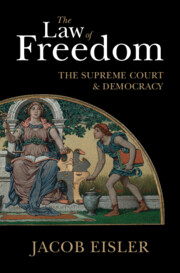Book contents
- The Law of Freedom
- The Law of Freedom
- Copyright page
- Dedication
- Epigraph
- Contents
- Preface
- Acknowledgments
- Introduction
- 1 The Counterpopular Dilemma
- 2 Constitutionalism and the Counterpopular Dilemma
- 3 Traversing the Dilemma
- 4 One Person, One Vote
- 5 Campaign Finance
- 6 Parties in Democracy
- 7 Race and Elections
- Conclusion
- Selected Bibliography
- Index
6 - Parties in Democracy
Facilitators or Usurpers of Popular Self-Rule?
Published online by Cambridge University Press: 06 July 2023
- The Law of Freedom
- The Law of Freedom
- Copyright page
- Dedication
- Epigraph
- Contents
- Preface
- Acknowledgments
- Introduction
- 1 The Counterpopular Dilemma
- 2 Constitutionalism and the Counterpopular Dilemma
- 3 Traversing the Dilemma
- 4 One Person, One Vote
- 5 Campaign Finance
- 6 Parties in Democracy
- 7 Race and Elections
- Conclusion
- Selected Bibliography
- Index
Summary
Political parties indisputably serve as intermediaries in converting individual political will into collective state governance. When they do so, are they servants or usurpers of constituent self-governance? While the White Primaries cases established that the Court intervenes when parties effect unequivocally illegitimate (i.e. racially exclusionary) democratic practice, when party affiliation activates constitutional scrutiny on a standalone basis remains unsettled. In areas such as state control over primary design and ballot access, the Court has struggled with parties’ dual status as public utilities and private organizations. This dual character has led to fierce debate regarding when the Court should police parties, and when they should be protected. Parties’ unsettled status has recently been exemplified by the partisan gerrymandering litigation, which highlights the debate over whether partisan coordination’s centrality to American governance facilitates or threatens popular self-rule. The Court has been hesitant to explicitly acknowledge that this raw question of parties’ impact on citizen self-rule drives its constitutional jurisprudence.
- Type
- Chapter
- Information
- The Law of FreedomThe Supreme Court and Democracy, pp. 200 - 243Publisher: Cambridge University PressPrint publication year: 2023

